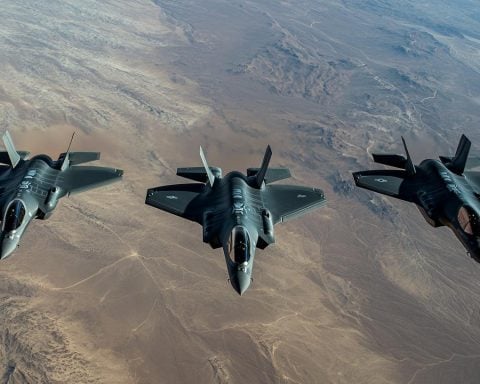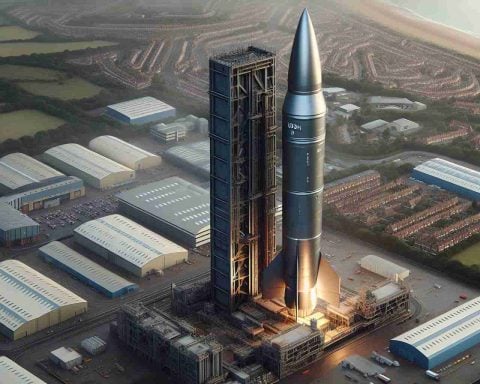Elon Musk Stirs Debate on Future of Air Combat
Billionaire entrepreneur Elon Musk, known for his innovative ventures like SpaceX and Tesla, recently challenged traditional views on air combat. Musk, who has been involved in discussions with US President-elect Donald Trump about reducing federal expenditure, voiced his opinion on the future of military aviation.
He strongly believes that drones represent the next step in air combat technology. Musk shared his perspective on his social media platform, asserting that piloted fighter jets might soon become unnecessary, as they pose risks to pilots in an era where drones offer a safer alternative.
The tech mogul criticized the continued production of manned fighter jets like the F-35, developed by Lockheed Martin. This advanced fighter aircraft, which became operational in 2015, is renowned for its stealth capabilities and intelligence gathering skills. Musk contrasted this traditional aircraft with a video showcasing numerous Chinese drones maneuvering seamlessly in formation, suggesting a shift toward unmanned vehicles.
Despite Musk’s critical stance, several countries, including Germany, Poland, Finland, and Romania, have recently invested in the F-35, demonstrating their continued reliance on advanced manned aircraft for national defense.
Musk’s comments have sparked discussions about the future of air combat, highlighting the potential shift from traditional fighter jets to drone technology. Will drones dominate the skies, making piloted jets relics of the past? The debate continues, fueled by Musk’s provocative remarks.
Are Piloted Fighter Jets on the Verge of Extinction? The Unseen Ripple Effects of Elon Musk’s Drone Advocacy
The recent debate ignited by Elon Musk’s comments on the future of air combat raises intriguing questions about the trajectory of military aviation and its potential impact on humanity and technology. Musk’s advocacy for drone technology over traditional piloted fighter jets like the F-35 isn’t just a commentary on military strategy; it’s a call to reassess how advancements in technology could shape the future of warfare and the ethical implications that arise.
New Dimensions in Air Combat: From Science Fiction to Reality
The suggestion that drones could replace manned fighter jets opens up a realm of possibilities previously confined to science fiction. With advancements in AI and machine learning, drones could potentially operate with greater precision, efficiency, and adaptability than human pilots. These autonomous aircraft could execute complex maneuvers and make instantaneous decisions that might challenge or surpass human capabilities.
Advantages and Potential Pitfalls of a Drone-Dominated Sky
The shift toward drones offers several advantages. Safety is a primary benefit, as removing pilots from the cockpit reduces human risk. Cost-effectiveness is another, as drones typically have lower production and operational costs than manned jets. Furthermore, drones can be deployed in swarms, offering strategic advantages in overwhelming adversaries with sheer numbers.
However, this trend comes with significant concerns. One glaring issue is the ethical dilemma: Who is accountable for decisions made by autonomous drones in combat scenarios? The psychological impact and dehumanization of warfare also pose risks, as reliance on unmanned systems might distance decision-makers from the grim realities of conflict, potentially making it easier to engage in hostilities.
Opportunities for Technological Growth
The rise of drone technology in military applications could accelerate broader technological growth. The development and refinement of AI technologies for drones can trickle down into civilian sectors, enhancing industries like logistics, agriculture, and search and rescue operations.
Will Aerospace Jobs Skyrocket or Collapse?
The implications for job markets in aerospace and defense sectors are complex. While the shift might reduce the demand for fighter pilots, it could simultaneously create opportunities in drone development, AI programming, and cybersecurity. Does this signaling a transformation in skill requirements and employment patterns?
Localized Defense: The Case for Mixed Fleets
While Musk’s opinion receives attention, the current global investment in aircraft like the F-35 indicates a belief in a mixed approach to defense. Nations such as Germany and Finland, despite recognizing the potential of drones, continue to see value in manned aircraft, indicating that both technologies will likely coexist for the foreseeable future.
How Does This Change Military Strategy?
If drones begin to dominate air combat, military strategy will have to evolve in response. This raises questions about international arms treaties, the development of counter-drone technologies, and even the potential for non-traditional warfare tactics using cyber capabilities to disrupt drone fleets.
In conclusion, Elon Musk’s provocative ideas about the dominance of drones could redefine traditional air combat paradigms, while offering humanity pathways to significant technological advancements. Yet, these possibilities are fraught with social, ethical, and strategic challenges that require careful navigation.
For more insights on advancements in technology and their impact, visit SpaceX and Tesla.


















